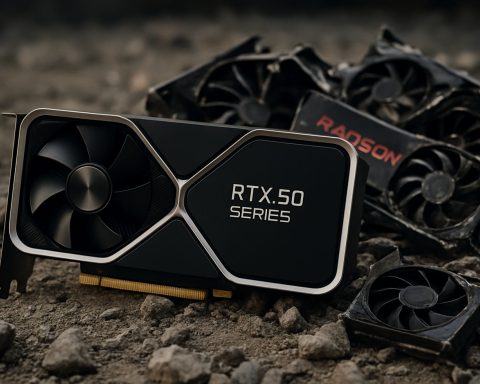- Quantum computing is transforming industries, with key players like Alphabet, Microsoft, IBM, IonQ, D-Wave, and Rigetti leading advancements.
- The industry could grow to $170 billion by 2040, promising computers that solve complex problems beyond the capabilities of today’s machines.
- Significant milestones include Google’s Willow processor achieving “quantum supremacy” and Microsoft’s Majorana 1 chip, signaling rapid innovation in the field.
- IBM’s nearly $1 billion investment in quantum technology includes hardware, cloud solutions, and open-source projects.
- Pioneering companies like IonQ and D-Wave focus on innovative technologies like trapped ions and quantum annealing, while Rigetti pushes with its Ankaa processor.
- Despite high expectations, full-scale transformative quantum computers may be two decades away, requiring patience from investors and developers.
- The choice for investors is between volatile upstarts and stable tech giants, with success hinging on technological breakthroughs and practical applications.
A revolution is quietly unfolding in the realm of computing, promising to reshape industries from finance to pharmaceuticals. The protagonists of this saga—alphabet soup notables like Alphabet, Microsoft, and IBM—march forward alongside nimble specialists like IonQ, D-Wave, and Rigetti. Together, these companies are venturing into the often-misunderstood world of quantum computing, a domain that is moving closer to transforming theoretical promises into practical realities.
This burgeoning industry, which experts predict could swell to a stunning $170 billion by 2040, captures imaginations with its tantalizing potential. Imagine computers that are not just faster, but exponentially so, conquering complex calculations that today’s most potent machines find insurmountable. Google ignited imaginations in 2024 with its Willow quantum processor, achieving what the industry dubs “quantum supremacy”—a milestone where quantum computers eclipse traditional ones.
Microsoft, never one to lag in the tech race, unveils its own breakthrough: the Majorana 1 quantum chip. This innovation marks a significant leap with its topological superconductor approach. As Microsoft dreams of a million-qubit future, its ambitions hint at quantum computers revolutionizing our world, from climate modeling to encryption.
IBM stands tall, having built a nearly $1 billion quantum empire since 2017. Integrating hardware, hybrid-cloud solutions, and open-source initiatives, IBM’s strategy spans the quantum landscape, steering the industry toward feasible commercial applications.
Yet, it isn’t only the tech behemoths making headlines. Pure-play companies, smaller yet ambitious, punch above their weight. IonQ’s finesse with trapped-ion technology and D-Wave’s prowess in quantum annealing underline the innovative vigor igniting this sector. Meanwhile, Rigetti Computing pushes forward with its robust full-stack approach, recently debuting its 84-qubit Ankaa processor, poised to expand its influence.
Nevertheless, temperance is key as enthusiasm sometimes outpaces reality. Nvidia’s CEO, Jensen Huang, offers a candid view: truly transformative quantum computers might still be two decades away. His words cooled the fever when speculative stocks surged in 2024, reminding investors of the industry’s infancy and the hurdles that remain.
Navigating this evolving field is not without risk. For investors, the choice teeters between the promising yet volatile upstarts and the stability of established tech titans. While companies like IonQ provide direct exposure, their precarious futures contrast with the resilience of diversified giants like Alphabet and IBM, equipped to weather both triumphs and setbacks.
As quantum computing climbs its developmental peak, the landscape remains rife with technical challenges but rich with possibility. Patience and long-term strategy will be crucial for those stepping into this quantum frontier. While speculative valuations today echo hopeful prospects, tomorrow’s market will reward innovations that leap from hypothesis to everyday implementation. Embrace this technological dawn; watch closely and stay poised to pivot as the quantum narrative unfolds.
Quantum Computing: The Silent Giant Set to Transform Industries
Understanding the Quantum Leap
Quantum computing is one of the most promising technological advancements on the horizon, poised to revolutionize industries ranging from finance to healthcare. This field, dominated by significant players such as Alphabet, Microsoft, and IBM, along with agile innovators like IonQ, D-Wave, and Rigetti, aims to turn the theoretical potential of quantum computers into practical applications.
How Quantum Computing Works
Quantum computers use qubits, which unlike traditional bits, can exist in a superposition of states. This property allows them to perform complex calculations much faster than classical computers. Solutions that are currently computationally expensive or impossible, such as breaking cryptographic codes and simulating complex molecules, could become feasible.
Market Trends and Predictions
The quantum computing industry is expected to grow to a staggering $170 billion by 2040. This projection stems from its potential to solve problems that are currently unsolvable with classical computing architectures. Businesses such as Google have already demonstrated “quantum supremacy,” proving that quantum computers can outperform classical ones for specific tasks.
Major Players and Innovations
– Google: Its Willow quantum processor achieved quantum supremacy, a significant milestone in the field.
– Microsoft: The introduction of the Majorana 1 quantum chip, using a topological superconductor approach, underscores its commitment to a million-qubit quantum future.
– IBM: Valued at nearly $1 billion, IBM’s quantum ecosystem integrates hardware, cloud solutions, and open-source initiatives, setting the stage for commercial applications.
Pure-Play Competitors
Despite the dominance of tech behemoths, pure-play companies like IonQ, D-Wave, and Rigetti hold their ground with technologies like trapped-ion and quantum annealing. Rigetti recently unveiled the Ankaa chip, marking advancements in the full-stack quantum computing approach.
Challenges and Limitations
Quantum computing is not without its challenges. The technology is still in infancy, with experts like Nvidia’s CEO, Jensen Huang, suggesting that transformation might take another two decades. There are technical hurdles, such as error rates and qubit coherence, that need to be overcome to scale this technology effectively.
Investment Considerations
Investors face the choice between the innovative yet volatile quantum start-ups and the stable giants like Alphabet and IBM. While start-ups offer direct exposure, their futures are uncertain. In contrast, tech giants, with diversified portfolios, offer a safer bet amidst the volatility.
Sustainability and Security Considerations
Quantum computers require significantly more power than traditional computers, raising sustainability concerns. Additionally, their ability to break current encryption standards poses security risks, necessitating the development of quantum-resistant cryptographic techniques.
Actionable Recommendations
1. Stay Informed: Follow industry leaders such as IBM and Microsoft for their latest advancements in quantum technology.
2. Invest Wisely: Consider the long-term strategy and potential of both established players and emerging startups.
3. Security Preparations: Evaluate current security protocols and plan transitions to quantum-resistant cryptography as quantum computing becomes more widespread.
The narrative of quantum computing is still being written. The potential for groundbreaking advances is immense, creating opportunities and challenges that will shape the future of tech and society. Stay updated with reliable sources to leverage these advancements effectively.











